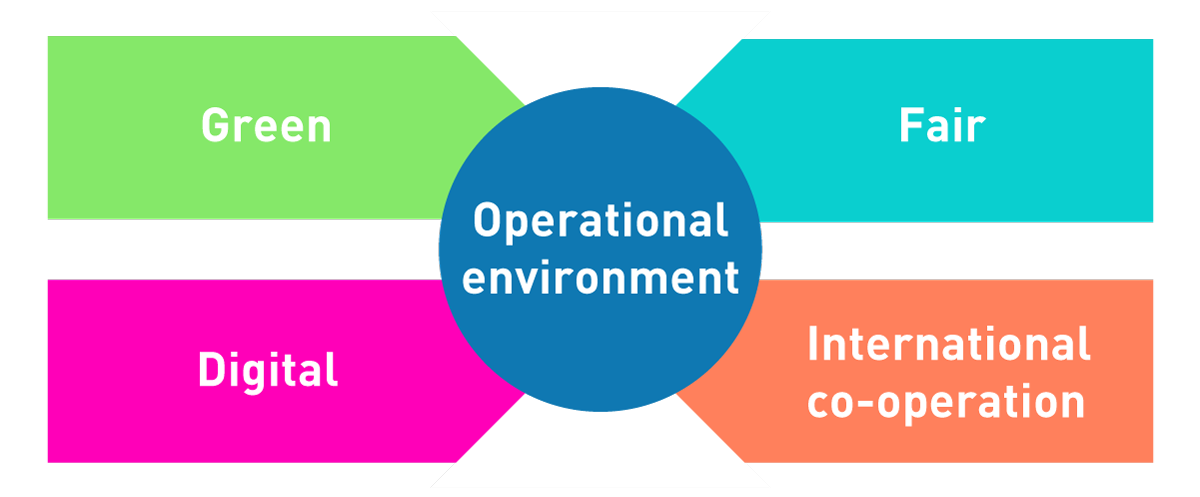Sustainable taxation is green, digital and fair

Sustainable taxation must be green, digital and fair. The global tax model is always the primary solution and therefore Finland must be closely involved in global cooperation. The operating environment and the effects of taxation on it are also a cross-cutting factor. These components complement each other and make it possible to build genuinely sustainable tax practices and mitigate the climate crisis.
The Technology Industries of Finland has also produced a low-carbon roadmap, more of which can be found here. It identified a number of means to promote green transition through tax measures, e.g. R&D tax incentive, low electricity taxation for industries, digitalisation and the impact of taxation on the operational environment.
The climate crisis is causing immense costs businesses and governments. Morgan Stanley estimates that climate-related disasters in 2016-2018 cost the world $ 650 billion. Swiss Re reports that the cumulative effects of climate change can be estimated to reduce global economic output by up to 14% by 2050 compared to growth without climate change. We have the necessary solutions to solve the climate crisis, and more and more new innovations and solutions are emerging. Supporting R&D funding for these solutions is vital. A rapid transition to a low-carbon economy will be much cheaper than the cost of an unbridled and uncontrolled climate crisis.
On the other hand, there is a significant growth potential for exports of Finnish low-carbon solutions which would in turn increase tax revenues. Implementing the global climate commitments countries have made will increase the demand for clean technologies and the need for low-carbon investments. Companies should be encouraged to accelerate the development of low-carbon and circular economy solutions, for example by implementing a comprehensive and permanent R&D tax incentive.
TIF’s EU forum 13 May 2022, discussing sustainable taxation (in Finnish)
Taxation should be green
The aim of green taxes is to reduce harmful environmental effects, such as CO2 emissions. Legislation on sustainable taxation should be prepared primarily from an environmental perspective, not to maximize tax revenues. The more carbon dioxide emissions in Finland decrease, the revenue from the emissions-based tax will naturally also decrease. Examples of green taxes are energy and environmental taxes.
The reform of the Energy Tax Directive is an example of how the EU is adapting energy taxation in line with the Green Deal and Fit for 55 objectives. Businesses have expressed their desire for stricter environmental standards to curb the climate crisis, and policymakers should take this requirement into account in their tax directives. Russia's war against Ukraine increases the need to cut the use Russian fossil energy even faster.
See our 10 principles of sustainable taxation here. (The translation is coming soon)
Taxation should be fair
The rationale for preparing new taxes is often justified by the claim that everyone should pay their fair share of taxes. Often the discussion focuses solely on corporate taxation. When it comes to fair and equitable taxation, we need to look at the taxation systems in its entirity: companies also pay other taxes and fees, and give rise to personal income taxes and value added taxes.
The OECD Pillar 2 and EU Minimum Tax Directive provide a basis for common accounting rules for corporate taxation and suggest a minimum tax rate of 15%. The proposed model rules and directive are still very complex and cumbersome, but if the model were to work, it would have the potential to make global taxation more coherent, efficient and fair.
Fairness in taxation must be considered also at the level of countries, not just taxpayers. The European Commission has proposed (the so-called 'new own resources' proposal) that, for example 25% of emissions trading system’s (ETS) revenues and 75% of the Carbon Revenue Mechanism's (CBAM) revenue should be allocated directly to the EU budget, instead of to Member States. In addition, it is proposed to move to qualified majority voting in EU tax matters, which would reduce Finland's opportunities to influence sustainable tax regulation.
If less tax revenue is directed to the Finnish budget due to changes in EU taxation, the shrinking tax base in Finland must not be compensated by increasing corporate and ownership taxation. Decisions on EU’s own resources and funding, as well as taxation must remain primarily a matter for the Member States’ sovereignty and require unanimity. There should be no shift to qualified majority voting in the EU in tax matters.
See our statement on the EU minimum taxation directive here. See our statement on the EU new own resources proposal here.
Digital green transition and digitalisation of taxation
Digitalisation is an essential element of the green transition. It should in fact be called digital green transition. Digitalisation and electrification are prerequisites for achieving the low-carbon targets. Digitalisation also eliminates the disadvantages of Finland's remote location.
Reasonable prices (including taxation) and availability of clean electricity are prerequisites for digitalisation. In addition, digitalisation should be supported, for example, through R&D tax incentives. In the green and digital transition of EU industry one must take into account cost-effectiveness, market-based approach and technology neutrality.
On the other hand, the digitalisation of taxation itself across the EU would lead to more efficient and automated tax processes. Instead of unproductive administrative work, companies could be able focus on their own core business.
Finland must contribute and participare to the EU's preparations for the digitalisation of taxation (including VAT for Digital Age) so that tax reporting and the tax procedures in Europe are as administratively light and uniform as possible. This will also make it easier to combat tax evasion. More uniform tax reporting and a well-executed harmonized tax base calculation model would also remove bureaucratic barriers to trade, as tax models would be compatible across borders.
The digitalisation of taxation must not be drafted only to fulfill the information requirements of the administration, but in cooperation with companies. Digitisation must promote real-time economy. RTE (Real-Time Economy) means that economic transactions and processes are digital and based on structural data. RTE is based on e.g. data from eReceipts and eInvoices.
RTE can bring significant savings and new tax income, for example by promoting the digitalisation of companies' own operations, creating multiple business opportunities, the reduction of administrative burdens on businesses and the public sector, and contributing to the functionality of the EU's digital internal market and European competitiveness.
Global co-operation in taxation
Global cooperation is essential if we want to curb the climate crisis. The business of companies is increasingly international. A international tax model should always be preferred. European or national tax models that are significantly different from the global ones might lead to tax disputes, double taxation and tensions in trade policy.
The OECD's proposal for a global minimum carbon price is an example of how governments can work together to find solutions that best address the climate crisis. Global cooperation is vital for an effective environmental policy, as well as for example curbing carbon leakage. The more widely the new tax regulations are applied, the wider the positive environmental impacts will be.
The competitiveness of Finland and other EU countries must be maintained, and the harmonization of the tax process globally will ensure that everyone is affected by similar rules. This promotes fairness of taxation. A international model is also better for the relative competitiveness of Finnish companies. Finland must be actively involved in international tax preparation in the EU and the OECD.
